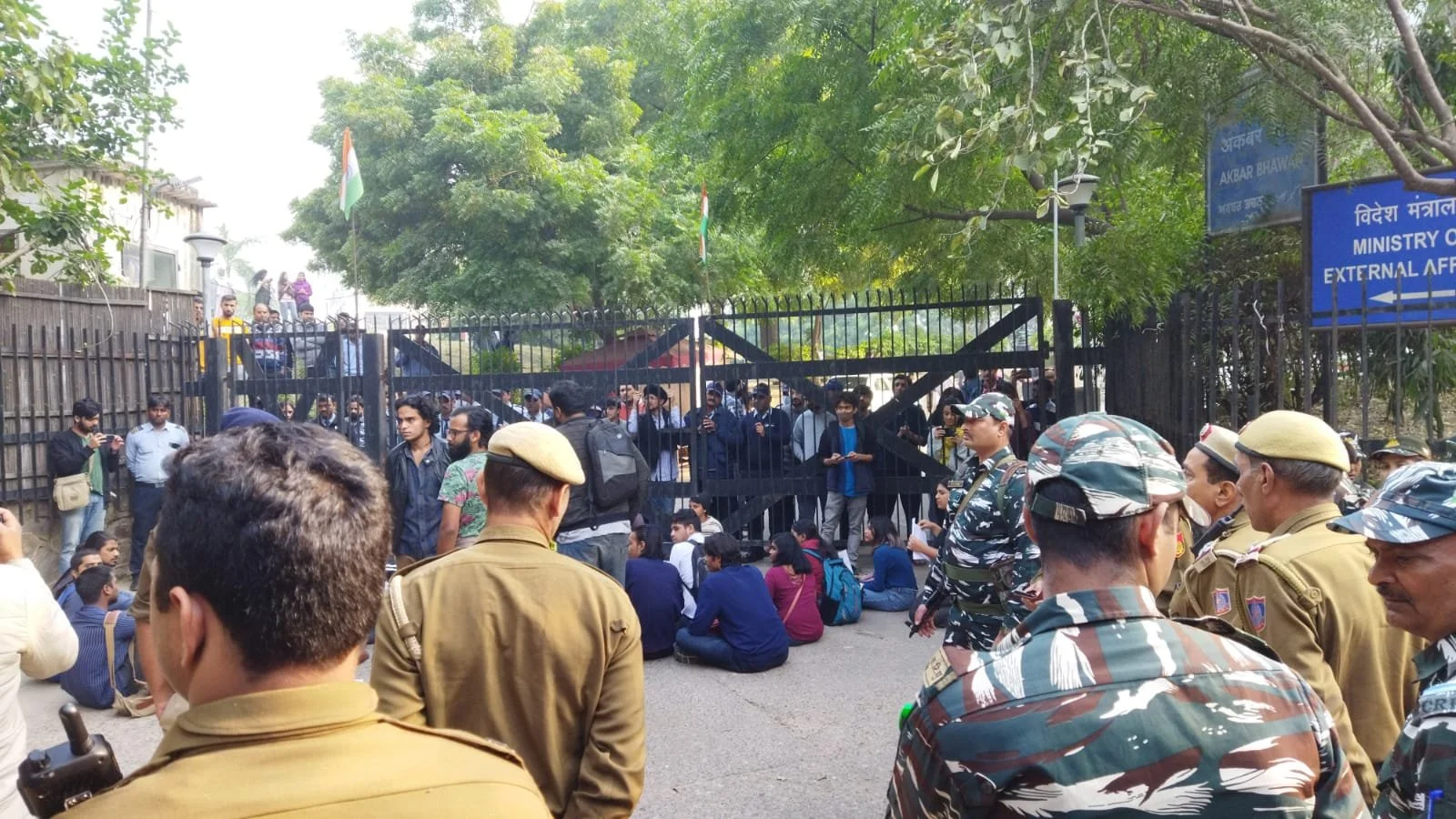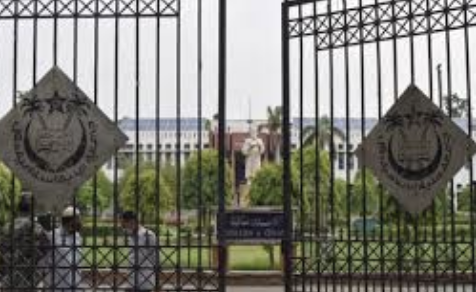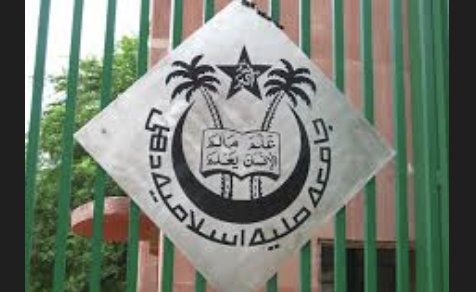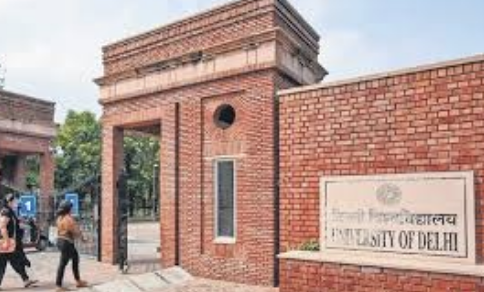Madness and Mayhem: The death of academic freedom at South Asian University
Haaris Moosa | 2 July 2023
South Asian University is an inter-governmental academic institution collectively run by SAARC and handheld by the Ministry of External Affairs, Government of India. But today, it has become an estranged child of a strained initiative. The university is known for providing quality and affordable education for students from all the eight SAARC countries and has been a springboard for many young academics in the region. However, the last few months have laid bare the slow decline of such a unique establishment into a microcosm of all the socio-political and democratic failings of South Asia. A measure of the failing of SAU can be understood from the emaciation of Academic freedom, the value of which seems to be clearly lost upon the current administration.
In order to contextualise the abysmal state of affairs at SAU it becomes important to look at the students' movement, that started in October 2022, which began with a demand for an increase in the stipend amount and student representation in Anti-sexual harassment and other relevant committees. According to various newspaper reports and my own engagement with the current students who participated in the protests, the University authorities suppressed the protests by initiating draconian disciplinary actions all the while refusing to engage with the protesters.
Ammar Ahmad, a first year Masters student of Sociology, hailing from Muzzafarpur, Bihar, suffered a series of seizures after being rusticated from the university in November,2022. Ammar’s family has publicly stated that the administration's actions had put him under severe mental and physical stress and this was compounded by his baggage as a first-generation scholar from a marginalised family. To this day Ammar continues to suffer from long term effects including speech and mobility impairment. His brother has filed a police complaint against the administrators of the university alleging that Ammar attempted suicide owing to institutional harassment. So far, the university has taken actions against thirteen students, suspended four professors and one member of the non-teaching staff.
Five faculty members were served with show-cause notices allegedly for instigating students to protest against the administrators. However, the faculty members claim that they have been singled out and targeted and the extent of their involvement is limited to the signing of three statements alongside ten other faculty members. The university authorities argue that the very act of signing these statements amount to professional misconduct according to the SAU byelaws. Therefore, it becomes imperative that these statements are examined carefully.
Protesting students and police at campus (source : author)
The first of the three statements was about the entry of police into the Akbar Bhawan campus. The second statement came after the university expelled, rusticated or suspended five students. It urged the university to break the impasse by initiating dialogue with the student community while also addressing the issue of the lack of due process in disciplinary actions against the students. Finally, the third statement pointed out the illegalities in the proceedings.
On 30th December 2022, the university issued show cause notices to five faculty members for signing these statements. A faculty member who was officiating as the Proctor was issued a show cause notice for allegedly not dealing with the protesters with an iron hand. Later, through an office memorandum that was never made public, a fact-finding committee was constituted to look into the allegations against four out of five faculty members. This committee met on 19th May, 2023 and provided the above-mentioned faculty members with an objective questionnaire. They were just given a day to answer hundreds of questions. However, when these faculty members found that the questions warranted careful thought and legal consultation, they declined to answer the questionnaire and were suspended pending investigation. It is to be noted that the office memorandum did not make out any prima facie case against them.
The suspension of the faculty members is of a piece with the draconian actions against the students and together they provide a complete picture of the erosion of academic freedom at SAU. Several other instances have been detailed by current students to substantiate this on the condition of anonymity as they fear disciplinary action.
A student from the department of Sociology, stated that one of their professors declined to deliver a lecture in another university as the administration was toeing the political line of the powers that be, and without a recorded copy of the lecture the professor would be subjected to disciplinary actions.
In another incident, when a student asked how one is expected to critically engage with social science disciplines in a deeply repressive academic environment, the professor commented that he might get a show cause notice for simply answering the question.
When a group of students met their professors to plead them to extend solidarity with Apoorva Y.K., who was on an indefinite sit in before the university gate for ten days, resisting her undemocratic expulsion, they were turned down by the professors out of the fear that they would be held accountable for Apoorva’s protest.
A professor from the department of legal studies, when questioned about nature of immunity enjoyed by SAU professors in the face of sexual harassment complaints against them, stated that students must abstain from asking such sensitive questions in public forums such as classrooms since it might lead to the university taking actions against them.
Further, the administration has gone to the extent of criminalising statements issued by independent study circles and collectives within the university.
Branding certain faculty members as the ideological progenitors of student activism amongst scholars from Dalit- Bahujan and other marginalized backgrounds, undermines the agency of students and is borne out of an instinct to infantilize and neuter independent critical thinking in the campus. One of the show cause notices issued to a student reprimanded him for attempting to ‘sensitise’ the administration towards mental health of students.
The South Asian University was conceived as a space where students belonging to eight different nations could come together and develop a holistic understanding of each other’s socio- cultural and economic realities. For such a university to meet its goals and create an eclectic culture, it is necessary to facilitate open dialogue. To draw an example, a classroom of International Law would have a Sri- Lankan student highly critical of actions of Indian peace- keeping forces during the civil war, whereas an Indian student might find it difficult to fathom that Indian forces could engage in violence. A sociology classroom would be enlivened by comparative perspectives offered by students coming from diverse national backgrounds. The Rohingya issue might split the Bangladeshi and Indian students into two different factions. While a Bangladeshi student might take offence to Urdu posters, an Indian Muslim student would vent his ideas publicly in the same language, here it becomes imperative for both the students to discuss their own histories of oppression and forge a certain solidarity. While the North Indian and Pakistani students engage in a deep discussion about the loss of life during partition, South Indian students would find themselves sharing more commonalities with Sri- Lankan students. Any professor operating in these spaces will not only be required to teach values of tolerance, empathy and patience within the classroom. It is to be understood a protest site is one such space where all these differences fuse to become collective demands. Therefore, protest sites, canteens, lawns are by extension academic spaces and faculty members are well within their rights to engage in such spaces.
South Asian University as a space cannot afford to manufacture fear among its students and create a pool of obliging lackeys. When Hijab becomes a raging debate, an Indian Muslim student may argue that she wears Hijab as a response to an increasingly repressive state which wants to police her body, but a Muslim student from Bangladesh may like to argue that it is patriarchal imposition from the majoritarian Islamic society and women must actively fight against it. While some non-Muslim students may weigh in their own responses based on their ideological orientations. The varied responses stemming from the socio-cultural and economic backgrounds of students must be curated and carried from canteens and classrooms to theses and articles, as was the practice hitherto.
The first statement issued by the faculty members against the entry of the Indian police into the South Asian University campus was meant to preserve the safe space that the university provides to its students who have varying nationalities. The invitation to the Indian police to the campus would be construed as a hostile response by foreign- national students, for whom detention by the Delhi Police could mean deportation or the loss of their visa and thus, education. For instance, the implication of such actions can be brought home by visualising the expulsion of a student from the Hazara community in Afghanistan, resulting in his deportation to a country where his life is endangered. Despite this, students of South Asian University who come from multi various socio-economic backgrounds have equally participated and continue to contribute to political activities on campus. Any empathetic educator would try to resolve tensions in such a sensitive space through dialogue and engagement with the students. However, the current administration does not seem to pay heed to such realities. As the suspended faculty members ponder over joining three expelled students in taking the matters to court, one question will always remain, “How did the academic fraternity in SAU let this ignominy go unprotested?”
-Haaris Moosa, Kochi based lawyer, LLM Class of 2020, SAU
Views expressed in this article are his personal






